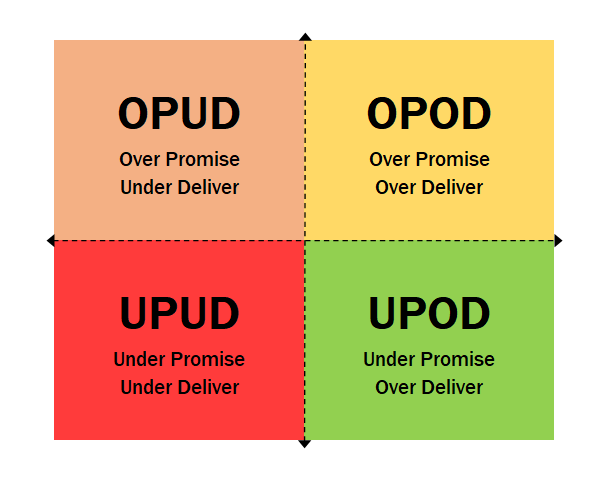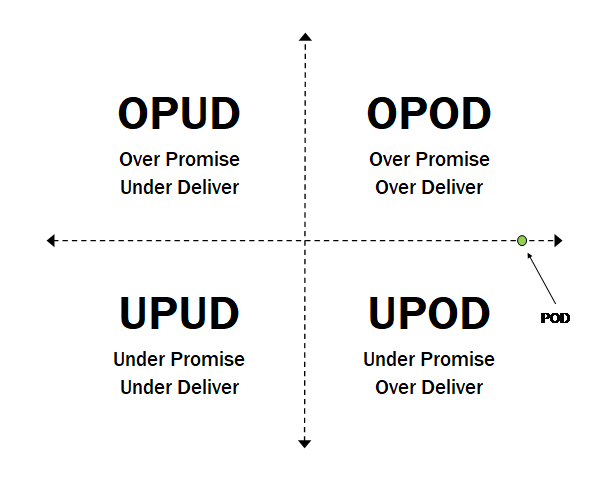I’ve learned the hard way that ambition without planning can backfire…
After 30 years of wisdom accrued—and more unfulfilled promises than I can count—I’ve done it again. I pulled an OPUD: Over Promise, Under Deliver. Want a surefire way to trap yourself in a spiral of anxiety and doubt? Just set wildly ambitious goals, attach arbitrary deadlines, and watch your reliability diminish.
Here’s the thing about promises and delivery: they exist on a spectrum, but I like to think of it as a grid—a matrix of four possible outcomes. On one axis, you’ve got how much you promise, and on the other, how much you actually deliver. Let's break down the key quadrants:
OPUD (Over Promise, Under Deliver): The trap we all fall into. Grandiose promises, disappointing results.
UPUD (Under Promise, Under Deliver): The danger zone. This is where ambition goes to die—apathy at its finest.
UPOD (Under Promise, Over Deliver): The safe spot. Exceeding modest expectations builds trust.
OPOD (Over Promise, Over Deliver): The unicorn. Aiming high and delivering even higher—rare, and usually unsustainable.
Ideally, we should live in the space between OPOD and UPOD. That zone is POD—perfectly reasonable Promising, followed by Over-Delivering. And we’ll get to that. But first, let’s talk about my latest OPUD.
The OPUD That Got Me
My most recent OPUD was the mid-August “hard launch” of my book and my podcast, 30s Rock. I started my LinkedIn post with “I am launching a podcast while I write my book in the meantime,” and ended it with “Though I'm not big on deadlines for creative undertakings, I expect to have the podcast up and running by the end of the month, and the book published by the end of the year.”
What was I thinking?
It’s now September 5th and, in truth, I do not expect the first podcast episode to be up for another 3-4 weeks. As for the book? 12-18 months, realistically. While I’m sure some of those who saw my LinkedIn post were of the I’ll believe it when I see it mindset to begin with, many of my close friends and family are genuinely waiting in anticipation.
In hindsight, my “promise”—which, by the way, should be seen as the mere equivalent of setting an expectation—was ambitious. That part I’m okay with. Candidly, ditching my potential career path to write and start a podcast is bold, if not audacious. Probably more audacious than bold, but still, I’m good with it.
But the deadlines I tacked on? Mistake. Nobody asked me for a deadline. No one was counting on me to hit these arbitrary dates. I painted myself into a corner by attaching timelines that served no one, except maybe my own desire to appear productive. In hindsight, a simple “Stay tuned!” would have sufficed.
So, that was my big OPUD of late.
The lesson? I did this to myself. And that’s okay. Enthusiasm is human, but it’s crucial to recognize when we’re setting ourselves up for failure.
Mastering Expectations: The UPOD Principle
This leads to an important realization: external expectations should always be lower than—or at least equal to—your internal ones. In other words, your promises to others should never exceed what you’re confident you can deliver. A good rule of thumb is to set external expectations about 20% lower than your internal goals. Think of it as a “margin of safety”—a crucial buffer that allows for flexibility and adaptability, without disappointing anyone, yourself included.
Living in the UPOD zone creates a pattern of reliability, where you build trust both with others and with yourself. This consistency is priceless; it builds your reputation as someone who can be counted on—a huge asset in both personal and professional relationships. Over time, this reliability doesn’t just boost how others see you; it also strengthens your self-confidence, creating a positive feedback loop that helps you maintain momentum.
Just as importantly, UPOD fosters inner peace. When there’s no looming panic or last-minute rush to meet inflated goals, you’re free to focus on delivering high-quality work. Sure, under-promising isn’t exactly bold. But, it gives you the freedom to exceed expectations rather than scramble to meet them.
And once you’ve mastered this balance, you can begin to gradually push your limits without risking a fallout. You’ll have built a solid foundation of trust and credibility, giving you the latitude to take bigger risks, knowing you’ve already earned the confidence of those around you.
OPOD: The Double-Edged Sword
Now, what about OPOD—the elusive realm of over-promising and over-delivering?
I’ve rarely seen anyone consistently pull off the OPOD without eventually crashing and burning. It’s a risky existence—self-defeating, even. There are, of course, rare exceptions. Elon Musk, for instance, is famous for making insane, seemingly impossible over-promises, yet somehow delivering. But he's an enigma—a rare exception to the OPOD rule. For every Elon Musk, there’s an Adam Neumann, who is a perfect example of summiting the OPOD mountain only to fail on the way back down.
Neumann’s company, WeWork, was built on massive over-promises. He branded it as a tech company, not a real estate firm, to justify sky-high valuations. Investors, including SoftBank, bought into his ambitious vision, and for a time, he delivered. But the over-promising caught up with him. WeWork’s failed IPO in 2019 exposed the gap between Neumann’s vision and reality, leading to his ouster and a dramatic collapse in the company’s value. Neumann now stands among those who serve as a cautionary tale of OPOD gone wrong.
What’s the lesson? OPOD is dangerous. Is it fundamentally dishonest? Not necessarily, but it often involves making promises you don’t truly believe you can deliver on. In some cases, it’s fueled by delusion—the belief that you can achieve the impossible without the necessary planning or resources. Regardless, even when OPOD works, it raises the stakes so high that each subsequent OPOD becomes even harder to pull off. Eventually, you’re setting yourself up for an inevitable OPUD.
POD: The Sweet Spot for Success
So, where should we aim instead? POD—perfectly reasonable Promising, followed by Over-Delivering:
This is the sweet spot for sustainable growth. By aligning your promises with realistic expectations, you create a foundation of trust, both with yourself and with others. How do you get there? Start by practicing UPOD—set your external promises 20% lower than what you think you can deliver. As you gain confidence and build a track record of exceeding expectations, you can gradually aim for POD.
This approach keeps you grounded while still allowing room to push your limits. As you close the gap between 80% and 100%, it signals to those around you that your conviction is growing—and it likely is. Remember, it’s not about lowering your ambitions. It’s about managing expectations—both your own and those of others.
However, be cautious when venturing into over-promising territory. The more you engage with irrational expectations, the higher the stakes become. No matter how well you execute, you're stacking the odds against yourself. Eventually, even the best reach a breaking point when expectations get out of hand, becoming victims of their own unfettered success.
The Final Takeaway
So, the next time you’re tempted to over-promise, stop and ask yourself: Am I setting myself up for success, or falling into the OPUD trap? Recalibrating from OPUD to UPOD requires restraint upfront, but it gives you the runway for long-term success. Your future self—and those counting on you—will thank you.







This is so interesting in how it applies to different facets of life. Love the concept of POD and all your thoughtful analysis.